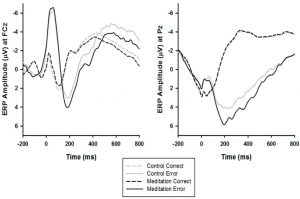Improve Brain Processing of Errors with Mindfulness
By John M. de Castro, Ph.D.
“meditation physically impacts the extraordinarily complex organ between our ears. Recent scientific evidence confirms that meditation nurtures the parts of the brain that contribute to well-being. Furthermore, it seems that a regular practice deprives the stress and anxiety-related parts of the brain of their nourishment.” – Mindworks
Mindfulness training has been shown to improve health and well-being. It has also been found to be effective for a large array of medical and psychiatric conditions, either stand-alone or in combination with more traditional therapies. As a result, mindfulness training has been called the third wave of therapies. Mindfulness training produces changes in the brain’s electrical activity. This can be measured by recording the electroencephalogram (EEG). The brain produces rhythmic electrical activity that can be recorded from the scalp.
One method to indirectly observe information processing in the brain is to measure the changes in the electrical activity that occur in response to specific stimuli. These are called event-related potentials or ERPs. The signal following a stimulus changes over time. The fluctuations of the signal after specific periods of time are thought to measure different aspects of the nervous system’s processing of the stimulus. Error related negativity is a negative going change in the EEG that occurs about a tenth of a second after committing an error in a lab task. This is followed 2 to 4 tenths of a second after error commission by a positive going change in the EEG called the error positivity. Using these parameters in the EEG, the ability of mindfulness meditation training to affect error monitoring can be investigated.
In today’s Research News article “On Variation in Mindfulness Training: A Multimodal Study of Brief Open Monitoring Meditation on Error Monitoring.” (See summary below or view the full text of the study at: https://www.ncbi.nlm.nih.gov/pmc/articles/PMC6770246/), Lin and colleagues recruited meditation naïve, healthy, right handed, female undergraduate students and randomly assigned them to a meditation or control group. Meditation consisted in a recorded 20 minute guided open monitoring meditation while the control condition consisted of an 18 minute TED talk. After they performed an arrow flanker task where the participant had to respond to an arrow stimulus and ignore irrelevant but distracting material. During the task the electroencephalogram (EEG) was recorded and the brain’s electrical responses to the arrow flanker task stimuli recorded (event-related potentials, ERP).
The groups did not differ in mindfulness or accuracy or reaction times in the flanker task. With the event-related potentials (ERP) they found that on trials where there was an error committed the meditation group had a significantly larger error positivity response. Surprisingly, and contrary to expectations, there were no group differences in error related negativity in the ERP.
The results suggest that brief open monitoring meditation in meditation naïve young women does not affect their ability to attend to a task and ignore distractions, but it does alter the electrical response of the brain to attentional errors committed. Error positivity has been linked to awareness of the errors and cognitive adjustments resulting from the errors. Hence, brief open monitoring meditation appears to improve awareness of error commission and perhaps future adjustments.
It should be noted that a one-time 20-minute guided meditation may not be sufficient to produce major changes in neural processing. Indeed, meditation practice has been found to improve attentional ability. So, there is a need to investigate error monitoring and detection and the brain’s responses after longer-term meditation practice in both men and women of a wider range of ages.
So, improve brain processing of errors with mindfulness.
“brain imaging techniques are revealing that this ancient practice can profoundly change the way different regions of the brain communicate with each other – and therefore how we think – permanently.” – Tom Ireland
CMCS – Center for Mindfulness and Contemplative Studies
This and other Contemplative Studies posts are also available on Google+ https://plus.google.com/106784388191201299496/posts and on Twitter @MindfulResearch
Study Summary
Lin, Y., Eckerle, W. D., Peng, L. W., & Moser, J. S. (2019). On Variation in Mindfulness Training: A Multimodal Study of Brief Open Monitoring Meditation on Error Monitoring. Brain sciences, 9(9), 226. doi:10.3390/brainsci9090226
Abstract
A nascent line of research aimed at elucidating the neurocognitive mechanisms of mindfulness has consistently identified a relationship between mindfulness and error monitoring. However, the exact nature of this relationship is unclear, with studies reporting divergent outcomes. The current study sought to clarify the ambiguity by addressing issues related to construct heterogeneity and technical variation in mindfulness training. Specifically, we examined the effects of a brief open monitoring (OM) meditation on neural (error-related negativity (ERN) and error positivity (Pe)) and behavioral indices of error monitoring in one of the largest novice non-meditating samples to date (N = 212). Results revealed that the OM meditation enhanced Pe amplitude relative to active controls but did not modulate the ERN or behavioral performance. Moreover, exploratory analyses yielded no relationships between trait mindfulness and the ERN or Pe across either group. Broadly, our findings suggest that technical variation in scope and object of awareness during mindfulness training may differentially modulate the ERN and Pe. Conceptual and methodological implications pertaining to the operationalization of mindfulness and its training are discussed.
